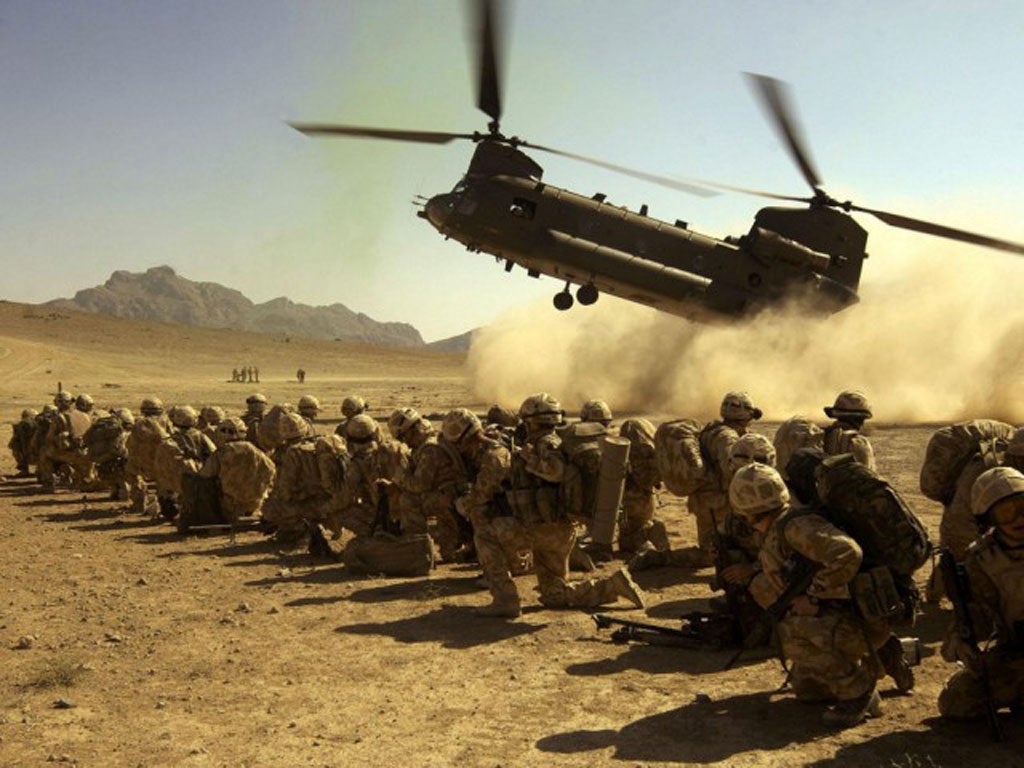Laptop footage triggered arrest of Helmand Marines
Murder suspicions were raised during porn investigation by civilian police

Seven Royal Marines were arrested on suspicion of the murder of a Taliban fighter in Helmand after police found footage on a laptop during a separate investigation into pornographic material, The Independent has learnt.
Examination of the computer by civilian police in the UK is said to have revealed images of a group of Marines in discussion about whether to provide medical aid to an injured Afghan lying on the ground.
The captive, who had sustained his injuries while attempting to ambush a patrol, later died.
The Independent understand that there were no images on the computer, which belongs to one of the arrested men, of the actual death of the insurgent.
An investigation was launched by the Royal Military Police and the seven men were all arrested on Thursday afternoon.
All those arrested were serving with 42 Commando Royal Marines in Helmand, Operation Herrick 14, last year in the districts of Nahr-e-Seraj and Nad-e-Ali as part of 3 Commando Brigade.
The deployment, under Brigadier Ed Davis, had some notable successes against the insurgency.
However, the Marines also lost seven killed in action; all of them from 42 Commando, who had taken part in some of the heaviest fighting. It was the unit's fourth tour of Afghanistan.
The rules for UK forces in relation to detention and interrogation in Afghanistan are supposed to be in accordance with the Geneva Conventions and the Convention against Torture and other Cruel, Inhuman or Degrading Treatment or Punishment.
Separately, there are rules of engagement laid down by the International Se- curity Assist-ance Force (Isaf), in Afghanistan that stipulate when the enemy can be deemed to be a threat allowing military action to take place.
A Ministry of Defence spokesman said: "These arrests demonstrate the MoD's and the Armed Forces' determination to ensure UK personnel act in accordance with their rules of engagement and our standards. It would be inappropriate to make any further comment while the investigation is under way."
The decision on whether or not to bring charges will be decided by the Director of Service Prosecutions. The rules for the length of time that suspects can be detained and questioned are the same as civilian cases.
This is the only the second occasion that any British service personnel had been arrested for alleged murder in the 11 years of the Afghan mission. In 2010 Fusilier Duane Knott, a soldier with the Territorial Army was investigated over the killing of an Afghan. But the prosecuting authorities decided that there was insufficient evidence to bring charges.
The situation is in stark contrast to the Iraq mission where there were a number of prosecutions over killings of civilians, one of the most high profile being that of Baha Moussa, who died with 92 injuries to his body while under interrogation.
It is believed that one reason for this is that by the time of the deployment to Helmand in 2006, the start of sustained campaigning by British forces, rules governing the behaviour of the forces have been significantly tightened.
However, the Ministry of Defence is in the process of launching an investigation into claims that an inquiry set up on alleged abuse of Iraqi civilians by UK forces has been deliberately ineffective.
Louise Thomas, an official with the Iraq Historic Allegations Team said she has resigned in protest at the lack of progress.
Formidable force: 42 Commando
The Royal Marines, although a formidable fighting force, do not have a reputation for brutality and their disciplinary record is better than most in the UK military. So there was a degree of surprise at the arrests of the seven men as murder suspects.
All the men being held are from 42 Commando, part of 3 Commando Brigade which was deployed in Helmand in the Nad-e-Ali and Nahr-e-Seraj districts last year in Operation Herrick 14.
The deployment, under Brigadier Ed Davis, saw some notable successes against the insurgency. However, the Marines also lost seven killed in action; all of them from 42 Commando, who had taken part in some of the heaviest fighting. It was the unit's fourth tour of Afghanistan.
By the end of their tour the Marines had "interdicted" more than 2.5 tons of explosive material leading to a 43 per cent fall in insurgent attacks and a dozen active Taliban commanders were killed.